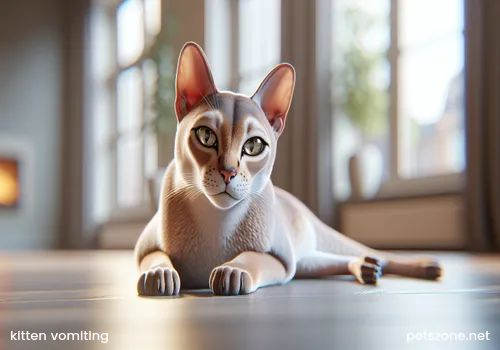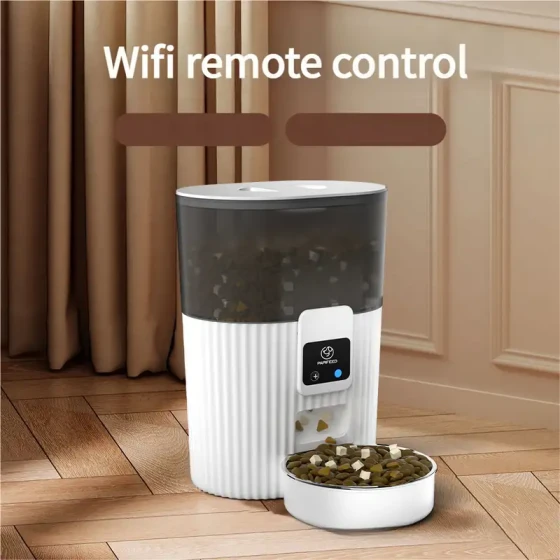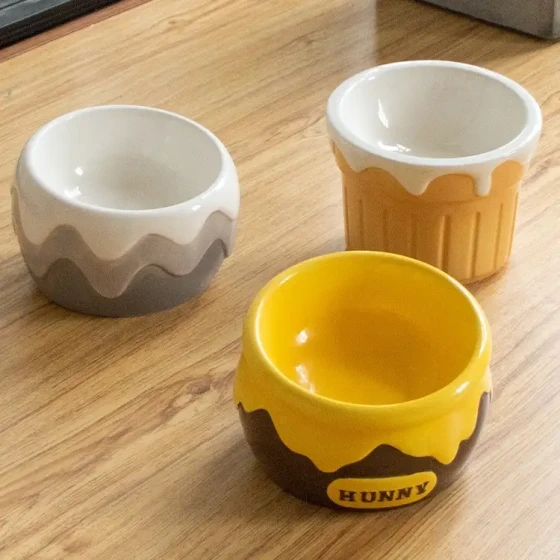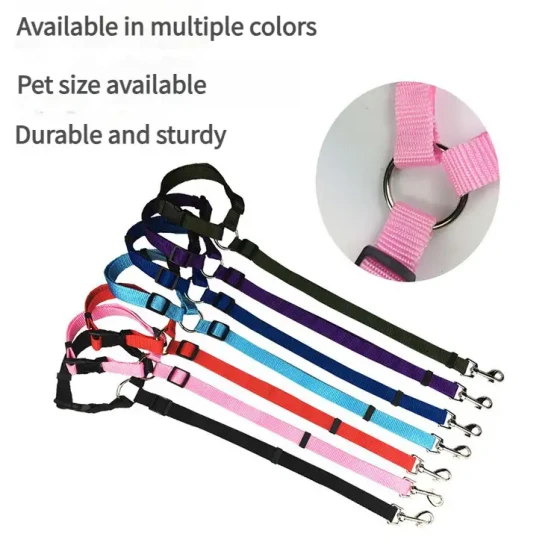What to Do When a Cat Vomits_Reasons and Solutions for Vomiting in 4-Month-Old Kittens
Cat vomiting is a situation many cat owners may encounter, especially common in lively and active 4-month-old kittens. Although occasional vomiting might be a minor issue, frequent vomiting or vomiting accompanied by other symptoms is serious. Timely judgment of vomiting causes and taking correct measures is key to protecting kitten health.

How Much Do You Know About Kitten Vomiting: Not Always Minor Problems, Beware of Major Risks Behind
Kittens, especially 4-month-olds, have immature gastrointestinal systems and relatively weak immunity, so they have a higher risk of vomiting than adult cats and are more prone to severe complications like dehydration. Therefore, as “cat dads and moms,” no kitten vomiting should be taken lightly. Sometimes vomiting is just a “minor episode” caused by eating too quickly or indigestion, but sometimes it may be a “distress signal” from an underlying disease. Understanding these common causes of vomiting can better help kittens get through difficult times.
Common Causes of Vomiting in 4-Month-Old Kittens
The causes of vomiting in kittens are varied; some are minor troubles, while others require high vigilance.
- Improper diet, “Disease Comes From the Mouth”
- Eating too fast or too much: Kittens are like little “greedy cats,” prone to gobbling up tasty food; eating too fast or too much can lead to food entering the stomach without adequate chewing and digestion, causing stomach discomfort or even direct “regurgitation.” It’s similar to humans feeling bloated after overeating at a buffet. Vomit in this case usually contains undigested kibble particles or food residues mixed with a small amount of stomach juice.
- Sudden food change: Kittens have sensitive gastrointestinal tracts, so sudden changes in cat food brand or type may cause indigestion and vomiting.
- Food intolerance or allergy: Some kittens may be allergic or intolerant to specific food ingredients, such as certain meat proteins or grains, causing gastrointestinal discomfort and vomiting.
- Spoiled food: Ingesting spoiled cat food or human food can cause food poisoning in kittens, triggering vomiting.
- “Bug Crisis”: Trouble Caused by Parasites
Because kittens have weaker resistance, they are more susceptible to parasitic infections, especially intestinal parasites like roundworms. These parasites multiply abundantly inside kittens, stimulating the intestines and causing vomiting, diarrhea, weight loss, and other symptoms. Sometimes, you may even see white thread-like worms in the vomit. - Curiosity Gone Wrong: Ingesting Foreign Objects
Four-month-old kittens are in a highly curious stage, enjoying exploring and chewing. Ingesting foreign objects like threads, small toys, plastic bags, or rubber bands accidentally, these can get stuck in the esophagus or intestines, causing obstruction or injury. This leads to persistent vomiting, possibly accompanied by abdominal pain and drooling. If the foreign object is sharp or thread-like, the consequences can be more severe, possibly leading to intestinal perforation requiring immediate veterinary attention. - Signal of Illness: Physical Discomfort
- Gastrointestinal infection or inflammation: Bacterial enteritis, viral infections (such as feline panleukopenia, feline coronavirus) can cause vomiting and diarrhea in kittens.
- Feline panleukopenia (feline distemper): This is a highly dangerous acute infectious disease for kittens, with symptoms including sudden high fever (body temperature may reach 41°C), stubborn vomiting (vomit is yellow-green), severe diarrhea (stools may contain blood and have a foul odor), loss of appetite, lethargy, and severe dehydration. Feline panleukopenia has sudden onset, rapid spread, and high mortality, especially affecting kittens aged 3-5 months. Immediate veterinary care is mandatory if these symptoms appear.
- Feline coronavirus (FCoV): Common but certain strains can cause severe diseases like feline infectious peritonitis (FIP), with symptoms including lethargy, poor appetite, fluctuating fever, weight loss, and sometimes vomiting.
- Poisoning: Accidental ingestion of toxic plants (such as lilies), insecticides, cleaning products, or medicines (such as some antibiotics, painkillers) can cause poisoning in kittens, leading to vomiting, diarrhea, apathy, and other symptoms.
- Other systemic diseases: Although rare in 4-month-old kittens, some systemic diseases like liver disease, kidney disease, pancreatitis, hyperthyroidism may also present early symptoms of vomiting.
- Gastrointestinal infection or inflammation: Bacterial enteritis, viral infections (such as feline panleukopenia, feline coronavirus) can cause vomiting and diarrhea in kittens.
- Stress Response: Emotional Fluctuations
Kittens may vomit due to gastrointestinal dysfunction triggered by mental stress, such as environmental changes (moving house, new family members), fright, or separation anxiety.
Assessing Vomiting Severity: When Is Immediate Veterinary Care Needed?
Judging whether a vomiting kitten needs urgent veterinary care requires comprehensive observation of vomiting frequency, duration, vomitus characteristics, and the kitten’s overall mental state.
Highly urgent situations requiring immediate veterinary care:
- Frequent and sustained vomiting: If a kitten vomits multiple times within a short period (for example, a few hours), or vomiting lasts more than 24 hours and the kitten refuses food and water, this rapidly leads to severe dehydration, endangering life.
- Accompanied by other severe symptoms:
- Lethargy and drowsiness: Kitten is clearly listless, uninterested in playing, or excessively sleepy.
- Poor appetite or total refusal to eat: Not eating or drinking for over 12 hours.
- Severe diarrhea: Especially watery stools, bloody stool, or foul-smelling stool. Vomiting with diarrhea accelerates dehydration and is very dangerous.
- Fever (temperature above 39.5°C): Normal kitten temperature ranges from 38°C to 39.2°C; fever signals infection or inflammation.
- Abdominal bloating or discomfort: Kitten resists abdominal touch or abdomen feels hard and swollen.
- Abnormal vomitus:
- With blood: Vomit appears red, pink, brown, or coffee-ground in appearance (indicating upper gastrointestinal bleeding), possibly from esophageal injury, gastric mucosal damage, or more serious internal bleeding.
- Contains foreign objects or parasites: Vomitus includes threads, plastic pieces, or other non-food items, or white, live thread-like worms.
- Yellow-green bile: If a kitten vomits after prolonged fasting, vomitus may be yellow or yellow-green bile. This may indicate gastritis or prolonged empty stomach.
- Unvaccinated or incompletely vaccinated kittens: These kittens have very low resistance to diseases like feline panleukopenia; more vigilance is needed when vomiting occurs.
Minor cases suitable for home observation and care:
- Occasional vomiting: Kittens vomit once occasionally, remain alert with normal appetite and no other accompanying symptoms.
- Vomitus consists of undigested food: Occurs shortly after eating and may result from eating too fast or too much.
- Hairball vomiting: Especially in long-haired kittens, occasional vomiting of hair-mixed gastric juice is normal.
Home Care and Emergency Treatments for Vomiting in 4-Month-Old Kittens
After assessing vomiting severity, different responses can be taken accordingly.
1. Home care (for mild, occasional cases)
- Short-term fasting from food and water: If the kitten remains alert after vomiting, fasting for 6-12 hours may be implemented (not exceeding 12 hours for kittens, adults may fast 12-24 hours) to allow gastrointestinal rest and avoid further irritation. Monitor closely and seek veterinary care if deterioration occurs.
- Gradual reintroduction of diet: After fasting, feed small amounts of easily digestible bland food multiple times, such as cooked, deboned chicken breast shredded finely or chicken puree, or unsalted rice porridge. Feed small portions about one-third of the usual amount each time, increasing gradually if no vomiting recurs.
- Hydration: Provide fresh, warm water in small, frequent amounts, using a syringe or small spoon to prevent large intake that could trigger vomiting again. Pet-specific oral rehydration salts can also be administered to replenish electrolytes and prevent dehydration.
- Modify feeding habits:
- Feed small frequent meals: Divide daily food amount into 3-5 small meals, avoiding large, rapid intake.
- Slow feeder bowls: Purchase a slow feeder bowl or place obstacles in the food bowl to slow down eating speed.
- Soak kibble in warm water: For kittens reluctant to drink or eating dry food too quickly, try softening dry food with warm water to increase water intake and aid digestion.
- Address hairball issues: Regularly groom kittens, especially during shedding seasons, to reduce ingested hair. Use hairball remedies or cat grass appropriately to help expel hairballs.
- Probiotic supplementation: After consulting a veterinarian, administer pet-specific probiotics in moderate amounts to regulate the gastrointestinal tract and promote digestion and absorption.
2. Emergency care (for cases requiring immediate veterinary attention)
- Seek veterinary care immediately: If severe symptoms occur as outlined above, promptly take the kitten to a veterinary hospital. Avoid self-diagnosis or human medications to prevent delays in treatment.
- Document and bring information: Before visiting the hospital, record vomiting frequency, duration, vomitus characteristics (photographs if possible), associated symptoms (diarrhea, mental state changes, appetite, drinking, temperature), and recent diet, vaccination, and deworming history. Detailed information helps veterinarians quickly diagnose.
- Protect the kitten: Wrap the kitten in a soft towel during transport to ensure comfort and safety, avoiding further vomiting or stress.
Tips to Prevent Vomiting in Kittens
“Prevention is better than cure.” Careful daily management greatly reduces the likelihood of vomiting in kittens.
- Regular feeding, small frequent meals: Develop a habit of feeding at regular times and in small amounts to avoid excessive hunger or binge eating.
- Choose high-quality cat food, transition gradually: Select high-quality food suitable for kitten age and constitution. When changing food, use the "seven-day transition method," gradually increasing new food proportion to let the gastrointestinal tract adapt over about a week.
- Regular deworming and timely vaccination: Follow the veterinarian’s advice for routine internal and external deworming and timely immunization against diseases like feline panleukopenia, effectively preventing many infectious diseases and parasitic infections causing vomiting.
- Secure hazards at home: Store small items (threads, rubber bands, earplugs), toxic plants (lilies, ivy), cleaning agents, medicines, and other potential ingestion risks out of kittens’ reach to avoid dangers from curiosity.
- Provide clean water sources: Ensure kittens have access to fresh, clean water at all times. Use pet drinking fountains to encourage water intake, benefiting digestive health.
- Maintain cleanliness: Regularly clean the litter box and living areas to reduce bacteria and parasite proliferation opportunities.
- Reduce stress: Kittens are sensitive to environmental changes. Avoid prolonged exposure to tension or anxiety-inducing situations, offer a quiet, comfortable, secure environment. Consult a vet for ways to reduce stress before outings or stress-inducing events.
- Regular grooming: Spend a few minutes daily grooming kittens, especially during shedding seasons, to reduce hairball formation.
Frequently Asked Questions
Q1: My cat vomited once but is energetic — do I need to see a doctor?
A1: If the cat vomits only once occasionally with normal mental state, appetite, and defecation, and no other abnormal symptoms, it is usually physiological vomiting caused by eating too fast, indigestion, or hairballs. Home observation and dietary adjustment are recommended, but if vomiting is frequent or with other symptoms, consult a veterinarian.
Q2: My kitten’s vomit is clear or yellow liquid — is it hungry?
A2: Yes. If a kitten has fasted too long, excessive gastric acid secretion without food to digest can cause vomiting of clear mucus or yellow bile. This indicates the owner may need to increase feeding frequency using small, frequent meals.
Q3: My kitten eats very fast and always finishes quickly. What to do?
A3: This is a common “gobbling” problem with kittens. Try using a slow feeder bowl or divide meals into smaller portions and feed in batches to prolong eating time.
Q4: Can I continue offering water after a cat vomits?
A4: After vomiting, short-term withholding of water (usually no more than 6-12 hours) allows the gastrointestinal tract to rest. Then offer water in small, frequent amounts to prevent dehydration. If vomiting persists and the cat cannot drink, immediate veterinary care with fluid therapy is needed.
Q5: Can I give probiotics after my cat vomits?
A5: After consulting the vet and confirming vomiting is not caused by a severe disease, moderate amounts of pet-specific probiotics can be given to regulate the gastrointestinal tract and aid digestion, but probiotics are not medications and do not replace professional treatment.
Conclusion
Vomiting in cats is unavoidable in cat care, especially in 4-month-old kittens, requiring dedicated attention from cat owners. Understanding common vomiting causes, mastering how to assess vomiting severity, and seeking timely veterinary care when necessary are essential lessons for every responsible cat parent. Remember, kitten health is like a fragile “seedling” needing careful nurturing. When they signal discomfort, prompt and proper responses help them grow strong and become your most adorable, healthiest “fur baby.”
References:
- Don’t panic when cats vomit, clarify causes first; a hospital visit isn’t always necessary (vertexaisearch.cloud.google.com)
- Common Questions - YaoShe Pets - Stress-free pet ownership! (vertexaisearch.cloud.google.com)
- Introduction to causes of cat vomiting and home differential diagnosis methods - Douban (vertexaisearch.cloud.google.com)
- Vomiting in cats | Help and Advice - Cats Protection (vertexaisearch.cloud.google.com)
- Is Your Kitten Throwing Up? Possible Causes and Treatment - Chewy.com (vertexaisearch.cloud.google.com)
- Cat Vomiting: 10 Causes and How to Help - Veteris (vertexaisearch.cloud.google.com)
- What to do when a kitten suddenly vomits? Vomiting food, yellow fluid, or dry retching? Understand the cause before deciding on vet visit! (vertexaisearch.cloud.google.com)
- What is feline panleukopenia? Symptoms, transmission, prevention, and treatment - VEC | 24/7 vet clinic in Hong Kong (vertexaisearch.cloud.google.com)
- What to do if your pet swallows a foreign object? Symptoms and the critical 72 hours - Pet Owner Guidance (vertexaisearch.cloud.google.com)
- Feline panleukopenia: a high-risk disease all cat owners must be aware of! - Happy Pet Hospital (vertexaisearch.cloud.google.com)
- Several cat distress signals, how to tell if a foreign object was ingested? - Weichong Pet Navigation (vertexaisearch.cloud.google.com)
- Is feline panleukopenia always fatal? Can it be cured? (vertexaisearch.cloud.google.com)
- Why Is My Cat Throwing Up And What Can I Do To Help? - Pawlicy Advisor (vertexaisearch.cloud.google.com)
- What to do if your cat eats a foreign object and vomits? Vet’s guide to identifying symptoms and handling - Reid Cat Litter (vertexaisearch.cloud.google.com)
- What to do when your cat swallows a foreign object? - Cat Info Channel (vertexaisearch.cloud.google.com)
- Miaoyue Science Popularization | What is the feline coronavirus spreading on Cat Island? - Company News - DXY (vertexaisearch.cloud.google.com)
- Secure small items at home: common foreign objects kittens accidentally ingest - BossCat (vertexaisearch.cloud.google.com)
- What is feline panleukopenia? - Shanghai Agriculture and Rural Committee (vertexaisearch.cloud.google.com)
- Why Does My Cat Keep Vomiting? Reasons Cats Throw Up - NexGard SPECTRA (vertexaisearch.cloud.google.com)
- Is Your Kitten Throwing Up? Possible Causes and Treatment (vertexaisearch.cloud.google.com)
- What to do when a cat vomits? (vertexaisearch.cloud.google.com)
- Stop asking what to do when cats vomit! "One chart" to help you identify vomit colors and frequency - Moreson (vertexaisearch.cloud.google.com)
- Cat Vomiting Battle Guide! Vet teaches how to identify causes and treatment - Royal Canin (vertexaisearch.cloud.google.com)
- What to do when cats vomit? 6 common causes and treatments - Defensive Works (vertexaisearch.cloud.google.com)
- Vomiting and Dehydration in Kittens - Colorado Animal Rescue (vertexaisearch.cloud.google.com)
- Farmina Pet Food - Nutrition Tips - Why Cats Vomit? (vertexaisearch.cloud.google.com)
- Quick understanding of feline panleukopenia, 8 early symptoms and treatments summary (vertexaisearch.cloud.google.com)
- What? Hunger can also cause vomiting? 7 causes of chronic vomiting in cats. - Tencent News (vertexaisearch.cloud.google.com)
- 8 Vet-Approved Home Remedies for Your Cat - PetMD (vertexaisearch.cloud.google.com)
- Rational Diagnostic and Therapeutic Approach to the Vomiting Cat - WSAVA2013 - VIN (vertexaisearch.cloud.google.com)
- How long to fast a vomiting cat, what medicine for cat vomiting - NetEase (vertexaisearch.cloud.google.com)
- What to do when your cat vomits? 5 common causes and detailed solutions in 3 minutes - Halo Hello (vertexaisearch.cloud.google.com)
- Vomiting in Cats | VCA Animal Hospitals (vertexaisearch.cloud.google.com)
- Vomiting in Cats - Cat Owners - MSD Veterinary Manual (vertexaisearch.cloud.google.com)
- Feline Infectious Peritonitis research progress - Beijing Renhe Huizhi IT Co., Ltd. (vertexaisearch.cloud.google.com)
- CN116042538A - A feline coronavirus and its application - Google Patents (vertexaisearch.cloud.google.com)
- Ensure your pet’s health during COVID-19 - DEOHS (vertexaisearch.cloud.google.com)
- Should kittens vomiting see a doctor immediately? Explaining what coffee-colored/white foam/yellow fluid means - OneDegree HK (vertexaisearch.cloud.google.com)
- Vomiting in Cats: When to Worry - Everypaw (vertexaisearch.cloud.google.com)
- Understanding feline infectious peritonitis - Pet Doctor Network (vertexaisearch.cloud.google.com)
- Cat Vomiting: Causes, Types, and What to Do | PetMD (vertexaisearch.cloud.google.com)
-560x560.webp)




